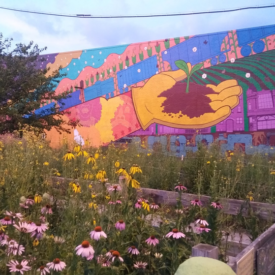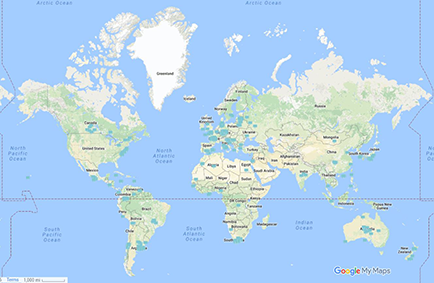As the Franciscan Sisters of Mary, compassionate care has long been an integral piece of our mission and ministry. While our earliest sisters founded and grew a hospital system to provide care for patients, the latest phase of our ministry is in supporting those who are doing the critical work of caring for creation. While our congregation’s focus shifted over the years, our commitment to compassionately care for all those we encounter has not waned.
Our philanthropy
From the earliest days of FSM’s philanthropic giving in 2013, it was important to our sisters to personally know our grantees, witness the fruits of their work, and support them in prayer. We believe deeply in the power of Presence. Over time, we have continued to step into our identity as a grant maker who strives to support our partners beyond just writing a check.
In 2018, we began to reshape our grantmaking program. We hired full-time staff and restructured our processes to embrace a more relational approach to our grantmaking. We made some big changes, like eliminating our written proposals, and some more subtle ones, like intentionally discussing topics of staff and organizational health with our partners.
Recognizing a need
As we have listened to our grantee and community partners over the years, we have recognized that there is a need for funders like ourselves to more intentionally support the internal strength, growth, and health of the people who make up our grantee organizations. The funding community’s passion for addressing some of our society’s greatest challenges – like climate change, poverty, hunger, and environmental racism – is inspiring and important. Sometimes, however, in our rush toward programmatic success and measurable outcomes, we overlook the basic needs of the individuals and teams who are doing that excellent work.
As the Franciscan Sisters of Mary, we believe that individuals’ health and well-being should be the center of all mission-driven work.
Late in 2019, in partnership with research consultant Jumana Vasi, we began a study exploring how we and other funders can better support frontline community, environmental justice, and environmental nonprofits in maintaining healthy and supportive workplace environments. We began to refer to this concept of a healthy and supportive work environment as Just Culture.
Defining Just Culture
We define a Just Culture as one where all nonprofit workers have access to fair compensation and benefits, pathways for shared decision making, opportunities to grow professionally, and the ability to work in a safe, welcoming, and healthy environment.
While we are using the term Just Culture in our studies and initiatives, we recognize that others in our field are doing similar work using terms such as culture of care or promoting healing justice. It is our intention that our own terms and learnings can join with our peers’ inspiring efforts to strengthen our collective movement.
Our learning process
During our study on Just Culture, nonprofit staff, volunteers, and board members shared with us in interviews and through an anonymized survey about the heavy cost of their work, the motivations that keep them going, and what is needed to better support them. We are deeply grateful to all our partners and the 104 survey participants who entrusted us with their reflections, stories, concerns, and hopes, throughout this process.
Alongside our research, FSM began to explore how we and other funders can better prioritize the health and wellbeing of our colleagues. We consulted with several peer funders about their related efforts, learnings, and reflections. Over the summer of 2020, FSM also piloted a Just Culture Fund, providing thirteen small grants to a pilot group of our existing partners to support the health and wellbeing of their staff, board, volunteers, or organizations.
In applying for Just Culture grants, grantees determined their own goals and priorities, ultimately applying funds to a variety of purposes ranging from leadership coaching to mental health resources, and remote-work technology to racial equity training. During this process, we learned the value of encouraging grantees to invest in themselves directly, exercising trust, and ultimately leaving the decision-making up to them. Leaders know their own organizations, people, and needs best.
Continuing the conversation
We are committed to continue building our understanding of what we, as funders, can do to support the health and wellbeing of our partners. We would like to invite you, whether as a nonprofit professional, board member, volunteer, or funder, to consider the ways we can promote Just Culture in the philanthropic and nonprofit sector together.
Please visit our new Just Culture website to view our research findings, hear from the perspectives of our partners, and explore actionable steps for your own organization.
We believe there is a role for all of us in this work, and we are eager to continue our learning process with you.

